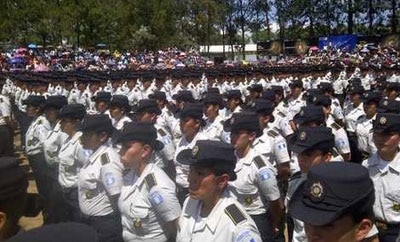The Guatemalan police purged 194 officers from its ranks for their criminal activities in 2012, and has fired 22 more so far in 2013, highlighting the extent of criminal infiltration in the National Police Force (PNC).
Among the Guatemalan police officers detained last year were five agents arrested for smuggling meth precursor chemicals, 11 for an attempted kidnapping, and 19 officers accused of kidnapping and money laundering, among other charges. The authorities say all 194 officers will face trial, reported Prensa Libre.
The officers were removed as part of the police anti-corruption measures being pushed by President Otto Perez Molina’s administration. The Commission for Police Reform is primarily responsible for overseeing the clean-up, now relying on a staff of 89 officers trained to perform internal inspections within the police.
Government Minister Mauricio Lopez Bonilla said that the government aims continue reform efforts in the coming year by increasing personnel levels, providing officers with better equipment, and encouraging the reporting of irregular activities within the force.
The firing of the corrupt officers has been complimented by ongoing efforts to expand Guatemala’s police. Mid-February saw 1,617 officers graduate from the Guatemala City police academy. Vice President Roxana Baldetti noted during the ceremony that another 4,000 are set to graduate between August and December 2013. All new graduates of the National Civil Police Academy must pass confidence tests.
The government’s plan also aims to improve efforts to tackle organized crime through reassessing where police are deployed. Assistant Security Minister Edi Juarez has said that the government has already determined which areas of the country are most in need of a larger police presence. Some of the most recent graduates will be placed in regions worst affected by the drug trade, organized crime and violence, including Peten, Escuintla, Quetzaltenango, Huehuetenango, and San Marcos.
InSight Crime Analysis
Police reform is clearly essential to improving security in a country with one of the highest homicide rates in the region, and is a purported objective of Perez Molina’s presidency. The government opened a new police training school in August 2012 and, shortly afterwards, announced plans to track police officers with micro-chips, in order to better monitor any suspicious movements by corrupt agents.
However, as think-tank the International Crisis Group outlined in a report last year, Perez’s deep-rooted military ties may serve as an obstacle to police reform, increasing the possibility that he will rely heavily on the military for security and thus undermine efforts to clean up the police.
Another concern is that as Guatemala continues to fire corrupt officers and train new ones, the force could face a shortage of equipment. Siglo 21 reported that following the recent graduation of newly trained officers, the government is now short 5,000 weapons for the police force. The government experienced the same problem last year when a class of officers graduated in August, one indication that resource shortages are a continuing constraint.

